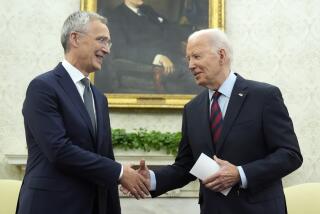Japan: a Long Way to Go on Defense : It Uses Allies’ Burden as Edge to Dominate Marketplace
- Share via
Modern Japan’s unprecedented economic success masks a terrible vulnerability. Because of that country’s meager commitment to defense, it is incapable, according to defense planners, of fending off even a moderate military incursion for more than 48 hours.
As a result, much of the financial responsibility for protecting Japan’s interests and responding to the Soviet buildup in that region of the world has fallen onto the United States. Many Americans question our role in the defense of a nation as wealthy as Japan. It’s a legitimate concern that has become increasingly troublesome in the light of declining American defense budgets.
For years many Americans have believed the myth that Japan cannot assume more responsibility for its own defense because of constitutional restrictions that were imposed after World War II. The familiar argument that the West insisted on such restrictions to prevent Japan’s return as a world military power has been used time and again to defuse criticism of Japan’s defense efforts.
In fact, Japan’s defense-spending limitation is self-imposed. The government’s decision in 1976 to limit defense spending to 1% of its gross national product was designed not only to mute domestic critics of renewed militarism but also to persuade Japan’s allies that it would not return to isolationism.
The Japanese asserted that the 1% formula, which linked defense expenditures to economic growth, was adequate to meet Japan’s share of the defense burden and to keep pace with Soviet military capabilities. This assertion has not withstood the test of time.
Japan’s defense budget of $22 billion for 1987 is 1.004% of the country’s projected gross national product. Its major Western allies spend much larger portions--5% to 6%--of their GNP on defense. The U.S. defense budget this year, for example, is $290 billion--about 6% of our nation’s economic output.
With one of the highest standards of living in the world, Japan dedicates only $100 per capita each year to defense. The United States spends 10 times as much, or about $1,000 per capita annually. Our allies in the North Atlantic Treaty Organization, with an average per-capita income lower than Japan’s, spend $500 to $600 per capita annually.
If Japan spent a percentage of its gross national product comparable to what its Western allies spend, its 1987 defense budget would total $60 billion to $70 billion, or three to four times the current level.
The recent effort to persuade Japan to increase its defense spending is driven not only by the desire to see that country bear a fair share of the costs of its own defense, but also by concern over the threat posed by Soviet deployments. Japan has not been responsive to changing conditions in its region of the world.
Since Japan’s 1% formula was devised in the mid-1970s, the Soviet Union has increased its presence in the Pacific region and now deploys 53 divisions in the Soviet Far East and Siberia. It also has brought Backfire bombers and SS-20 medium-range missiles east of the Urals, and has deployed a Soviet fleet in the Pacific that is larger than the U.S. Navy worldwide.
To respond to this threat from the Soviet Union, the United States has been forced to take on larger commitments. Ten years ago we were winding down our Pacific presence in the wake of the Vietnam War. Now we maintain a military force of 55,000 personnel in Japan, not counting our naval forces afloat and our forces deployed in South Korea.
Although the Japanese spend roughly $1 billion a year to support our military forces, they restrict that support to construction projects that greatly benefit their civil economy and are repaid by our military in the form of rent.
The decision to restrict defense expenditures not only jeopardizes Japan’s ability to defend itself but also gives that nation a major edge over its Western allies in the international marketplace. The United States and Japan’s other trading partners are at a competitive disadvantage--Japan’s exports bear no part of the free world’s defense burden.
Prime Minister Yasuhiro Nakasone’s recent decision to breach the 1% spending limit, even if just barely, is a heartening step in the right direction. The Japanese have thus cleared a psychological hurdle through the political leadership of the prime minister and the diplomatic skills of our indomitable ambassador, Mike Mansfield.
At the same time, Japan has a long way to go in the field of defense. We must remain alert. If Japan’s current effort to increase defense spending stalls, the United States will continue to be saddled with an inequitable share of the Pacific defense burden.
For the sake of fairness and, just as important, for the sake of its own national security, Japan must do even more.
More to Read
Inside the business of entertainment
The Wide Shot brings you news, analysis and insights on everything from streaming wars to production — and what it all means for the future.
You may occasionally receive promotional content from the Los Angeles Times.










